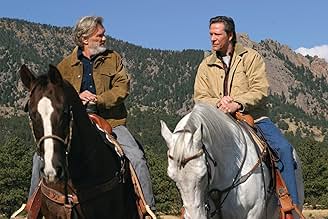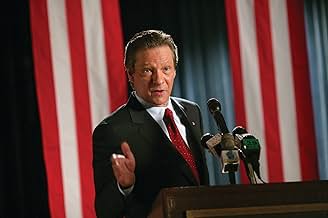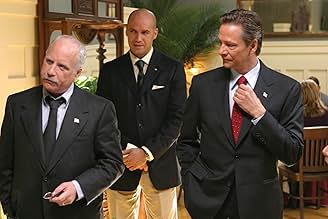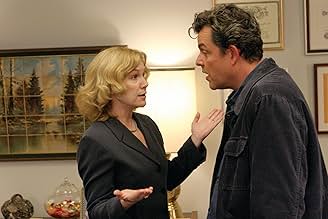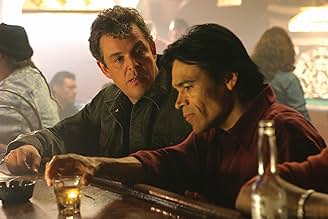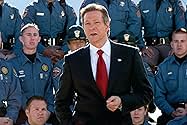AVALIAÇÃO DA IMDb
6,0/10
4,3 mil
SUA AVALIAÇÃO
Adicionar um enredo no seu idiomaThe discovery of a corpse threatens to unravel a bumbling local politician's campaign for governor of Colorado.The discovery of a corpse threatens to unravel a bumbling local politician's campaign for governor of Colorado.The discovery of a corpse threatens to unravel a bumbling local politician's campaign for governor of Colorado.
- Direção
- Roteirista
- Artistas
- Prêmios
- 1 vitória e 1 indicação no total
Avaliações em destaque
I was disappointed by this. Oh, it is great fun goofing on any politician, the more smarmy and sanctimonious the better. But I can get political goofs by the dump truck load from elsewhere. What I expected was something as gently incisive as, say, "Doonesbury," but with the cinematic skills we know Sayles has. Something as gentle and sharp as "tanner on Tanner."
We have three threads here. The first is the depiction of the system, the handlers and supporters that "make" a president. We all know how it is; many politicians admit it and nearly all journalists report on it. There isn't a shred of newness in this thread, and surely not out of Dreyfuss.
There's a second component having to do with the story that wraps the thing. Now here is where I expected some art. What we end up with a single big corporation as the bad guy, no, beyond that a single corporate man. Then we see how his misdeeds unravel a bit. Sure, we have payoffs, bribery, rampant disregard for the environment and a cover-up.
But see. The thing to make fun of is how some reduce big complex issues to simple narratives. How they take a million threads of a complex tapestry with inscrutable hues and patterns and reduce it to a paper towel with flag patterns. So why do the same thing when satirizing them? Why? It isn't as if there aren't people in the film world incapable of doing this? Or was it just a rush job?
Most people let all that slip because Chris Cooper's version is too delicious. Here's the problem with this: its not disturbing enough. The thing with the target's speech is how he needs to have his mouth work, but his mind cannot produce the coherent thought fast enough, so it looks for stored phrases and tries to evaluate them for appropriateness on the fly. This gives both odd pauses and sometimes goofy leaps in concepts and metaphors.
Listen to Cooper and pay attention to the leaps. Both are fabricated for dramatic effect. The pauses are regular. They're not even, but they have multiples: pause, twice as long three times as long. And they have a rhythm that if you listen makes a sort of sense.
Now look at the linguistic leaps. They have the same patterns, regular semantic distances. That's because we as viewers have to be in on the joke. We know he will jump and precisely how far. We just don't know the direction. See, humor is in the unexpected and in order for it to work, you need to set expectations.
Now, dear reader, listen to the target. He is not creating something as art, he is just living. What you will find is a well-studied artifact of a man whose cognitive centers have been damaged by cocaine saturation. There is no regularity. Pauses are random. The semantic distances are random. That's the whole point. This is what you find in substance abusers. Always. It is not dumbness but drug damage.
Oddly the National Institutes of Health had a great research program on this because all sorts of conditions like Alzheimers can be diagnosed by measuring these speech effects. But once the link was make to cocaine users, the program was terminated. Now that would make a good movie, Huh?
Ted's Evaluation -- 2 of 3: Has some interesting elements.
We have three threads here. The first is the depiction of the system, the handlers and supporters that "make" a president. We all know how it is; many politicians admit it and nearly all journalists report on it. There isn't a shred of newness in this thread, and surely not out of Dreyfuss.
There's a second component having to do with the story that wraps the thing. Now here is where I expected some art. What we end up with a single big corporation as the bad guy, no, beyond that a single corporate man. Then we see how his misdeeds unravel a bit. Sure, we have payoffs, bribery, rampant disregard for the environment and a cover-up.
But see. The thing to make fun of is how some reduce big complex issues to simple narratives. How they take a million threads of a complex tapestry with inscrutable hues and patterns and reduce it to a paper towel with flag patterns. So why do the same thing when satirizing them? Why? It isn't as if there aren't people in the film world incapable of doing this? Or was it just a rush job?
Most people let all that slip because Chris Cooper's version is too delicious. Here's the problem with this: its not disturbing enough. The thing with the target's speech is how he needs to have his mouth work, but his mind cannot produce the coherent thought fast enough, so it looks for stored phrases and tries to evaluate them for appropriateness on the fly. This gives both odd pauses and sometimes goofy leaps in concepts and metaphors.
Listen to Cooper and pay attention to the leaps. Both are fabricated for dramatic effect. The pauses are regular. They're not even, but they have multiples: pause, twice as long three times as long. And they have a rhythm that if you listen makes a sort of sense.
Now look at the linguistic leaps. They have the same patterns, regular semantic distances. That's because we as viewers have to be in on the joke. We know he will jump and precisely how far. We just don't know the direction. See, humor is in the unexpected and in order for it to work, you need to set expectations.
Now, dear reader, listen to the target. He is not creating something as art, he is just living. What you will find is a well-studied artifact of a man whose cognitive centers have been damaged by cocaine saturation. There is no regularity. Pauses are random. The semantic distances are random. That's the whole point. This is what you find in substance abusers. Always. It is not dumbness but drug damage.
Oddly the National Institutes of Health had a great research program on this because all sorts of conditions like Alzheimers can be diagnosed by measuring these speech effects. But once the link was make to cocaine users, the program was terminated. Now that would make a good movie, Huh?
Ted's Evaluation -- 2 of 3: Has some interesting elements.
What film depicts corrupt politicians and businessmen controlling a vast local resource but enduring a sometimes-hapless yet attractive detective investigating a murder involving those community leaders? If you said 'Chinatown,' you'd be correct; if you said 'Silver City,' you'd also be correct. There are other similarities such as both have stars with last names Huston, and justice is long coming. Beyond that, there is no qualitative similarity: Roman Polanski's 'Chinatown' is a classic; John Sayles' 'Silver City' is a contemporary curiosity.
'Contemporary' because the liberal Sayles writes and directs about a political campaign for the governorship of Colorado that barely disguises its protagonists as George Bush (Chris Cooper) and Karl Rove (Richard Dreyfuss) knockoffs. Cooper's candidate has halting, incomplete, and scripted sentences, undoubtedly the speech patterns of Bush. The manipulative and effective machinations of Dreyfuss's operative are patently those of the infamous Bush campaign mastermind.
The story and dialogue are undistinguished, as if they count on the audience to be mesmerized by the broad parallels to the 2004 campaign. (See 'Primary Colors' for wit and grit about the Clinton campaign, starring John Travolta.) Although Danny Huston (son of John and brother of Angelica) is a lesser Jack Nicholson, his easy-going persona works well for a detective who constantly gets himself into trouble rather than his clients out of it.
The comparison to Michael Moore's documentary 'Fahrenheit 911' is inevitable. The heavy-handedness of 'Silver' makes Moore's work look almost subtle, yet Sayles must be praised for his dissenting voice in parlous times for free speech. Sayles is more successful in weaving the intricate patterns of corruption in 'City of Hope'; here he seems more like Moore in an overt attempt to topple a sitting president. Sayles's 'Lone Star' is more believable, and that's about incest.
John, Viscount Morley in 'Rousseau' wrote, 'Those who would treat politics and morality apart will never understand the one or the other.'
These filmmakers understand both in varying degrees of success.
'Contemporary' because the liberal Sayles writes and directs about a political campaign for the governorship of Colorado that barely disguises its protagonists as George Bush (Chris Cooper) and Karl Rove (Richard Dreyfuss) knockoffs. Cooper's candidate has halting, incomplete, and scripted sentences, undoubtedly the speech patterns of Bush. The manipulative and effective machinations of Dreyfuss's operative are patently those of the infamous Bush campaign mastermind.
The story and dialogue are undistinguished, as if they count on the audience to be mesmerized by the broad parallels to the 2004 campaign. (See 'Primary Colors' for wit and grit about the Clinton campaign, starring John Travolta.) Although Danny Huston (son of John and brother of Angelica) is a lesser Jack Nicholson, his easy-going persona works well for a detective who constantly gets himself into trouble rather than his clients out of it.
The comparison to Michael Moore's documentary 'Fahrenheit 911' is inevitable. The heavy-handedness of 'Silver' makes Moore's work look almost subtle, yet Sayles must be praised for his dissenting voice in parlous times for free speech. Sayles is more successful in weaving the intricate patterns of corruption in 'City of Hope'; here he seems more like Moore in an overt attempt to topple a sitting president. Sayles's 'Lone Star' is more believable, and that's about incest.
John, Viscount Morley in 'Rousseau' wrote, 'Those who would treat politics and morality apart will never understand the one or the other.'
These filmmakers understand both in varying degrees of success.
John Sayles repeats himself in "Silver City," borrowing very heavy-handedly from his much more effective takes on local politics and the environment that spawns it, from his "City of Hope" (urban NJ), "Lone Star" (Texas)--which also featured Kris Kristofferson in a not dissimilar role-- and "Sunshine State" (Florida), though now he's taking on Colorado.
Other actors also seem to be present for their resonance from other features, Michael Murphy from "Tanner 88," Daryl Hannah almost as crazy as she was in "Kill Bill, Volume 2," and Richard Dreyfuss channeling Duddy Kravitz as a campaign manager.
While Chris Cooper is very effective in capturing a George W. Bush-type politician from a family dynasty, Danny Huston switches confusingly from cynical ex-journalist/investigator to naif as he uncovers a scandal with ever-widening yet encircling entanglements of class, ethnicity, media, real estate, wildlife, etc. etc.
While the satire is scarily amusing, the final scene of this overlong film is literally overkill.
Sayles as usual carefully picks the songs on the soundtrack, here there's frequent Cowboy Junkies tracks.
Other actors also seem to be present for their resonance from other features, Michael Murphy from "Tanner 88," Daryl Hannah almost as crazy as she was in "Kill Bill, Volume 2," and Richard Dreyfuss channeling Duddy Kravitz as a campaign manager.
While Chris Cooper is very effective in capturing a George W. Bush-type politician from a family dynasty, Danny Huston switches confusingly from cynical ex-journalist/investigator to naif as he uncovers a scandal with ever-widening yet encircling entanglements of class, ethnicity, media, real estate, wildlife, etc. etc.
While the satire is scarily amusing, the final scene of this overlong film is literally overkill.
Sayles as usual carefully picks the songs on the soundtrack, here there's frequent Cowboy Junkies tracks.
You'll never look at "W" again without thinking of Dickie Pilager! Nice piece of political satire and all too true. Well shot...well acted... and well directed. The characters are slightly "comic bookish" but consider their real life counterparts.
Be sure to look at the "Additional features" on the DVD. It contains some very pointed social commentary from some very concerned and talented individuals. This movie is probably more important now that we have had the election outcome of 2004.
The Haskell Wexler cinematography is really excellent. Be sure to notice the backgrounds when he is interviewed!
Be sure to look at the "Additional features" on the DVD. It contains some very pointed social commentary from some very concerned and talented individuals. This movie is probably more important now that we have had the election outcome of 2004.
The Haskell Wexler cinematography is really excellent. Be sure to notice the backgrounds when he is interviewed!
I'm surprised at the opening negative reviews this film is receiving on the board. The suggestion this film is the worse Sayles had to offer gives his last couple films a better rating than they deserve -- the baby adoption one seemed unfinished and the one with the Florida (?) resort building was a bit bland to say the least. It is quite true that Silver City does not meet the standards of "Lone Star" and other great Sayles films -- he has gone into a bit of a slump. Still, this film suggests we might hope he is climbing out of it.
The film still seems more about sending messages than entertaining. The obvious Dubya clone is too broad, and we don't we see how he ticks. Richard Dreyfuss is great as the campaign director, though he too doesn't really get another screen time. Still, on the whole, there is a lot to offer, especially the sense of place (though some of the mountains look like fake background). Sayles also offers some great supporting characters, as always. Daryl Hannah must be underlined here; she is quite a find -- who knew?
Liking the film, I guess, depends on liking the former news reporter given the role to investigate an embarrassing find. I enjoyed Danny Huston's character and found his investigations handled well. The caterer/chef he hires to help him out also gives a nice performance as does Huston's ex-g/f, the reporter. As do others they both meet along the way. For instance, the scenes involving an investigative website and rightwing talk show host were enjoyable.
The film ends on a realistic note that is refreshing. It tells a story, stories actually, while preaching its message. And, some of the "bad guys" (including Kris Kristofferson) are not portrayed as evil slimebags or anything, adding a sense of fairness to the whole thing.
A flawed movie that remains an enjoyable movie for mature moviegoers.
The film still seems more about sending messages than entertaining. The obvious Dubya clone is too broad, and we don't we see how he ticks. Richard Dreyfuss is great as the campaign director, though he too doesn't really get another screen time. Still, on the whole, there is a lot to offer, especially the sense of place (though some of the mountains look like fake background). Sayles also offers some great supporting characters, as always. Daryl Hannah must be underlined here; she is quite a find -- who knew?
Liking the film, I guess, depends on liking the former news reporter given the role to investigate an embarrassing find. I enjoyed Danny Huston's character and found his investigations handled well. The caterer/chef he hires to help him out also gives a nice performance as does Huston's ex-g/f, the reporter. As do others they both meet along the way. For instance, the scenes involving an investigative website and rightwing talk show host were enjoyable.
The film ends on a realistic note that is refreshing. It tells a story, stories actually, while preaching its message. And, some of the "bad guys" (including Kris Kristofferson) are not portrayed as evil slimebags or anything, adding a sense of fairness to the whole thing.
A flawed movie that remains an enjoyable movie for mature moviegoers.
Você sabia?
- CuriosidadesThe Bentel company logo is a direct copy from Bechtel Corporation which is a real American defense contractor.
- Erros de gravaçãoWhen Danny is splashing in the mine, the type of flashlight he is holding changes several times.
- ConexõesReferenced in Tell Them Who You Are (2004)
- Trilhas sonorasMining for Gold
Written by Philip Thomas and James Gordon
Performed by Cowboy Junkies
Courtesy of BMG Music Canada Inc.
Under license from BMG Film & TV Music
Principais escolhas
Faça login para avaliar e ver a lista de recomendações personalizadas
- How long is Silver City?Fornecido pela Alexa
Detalhes
Bilheteria
- Orçamento
- US$ 5.000.000 (estimativa)
- Faturamento bruto nos EUA e Canadá
- US$ 1.020.656
- Fim de semana de estreia nos EUA e Canadá
- US$ 337.484
- 19 de set. de 2004
- Faturamento bruto mundial
- US$ 1.384.395
- Tempo de duração
- 2 h 8 min(128 min)
- Cor
- Mixagem de som
- Proporção
- 1.85 : 1
Contribua para esta página
Sugerir uma alteração ou adicionar conteúdo ausente



